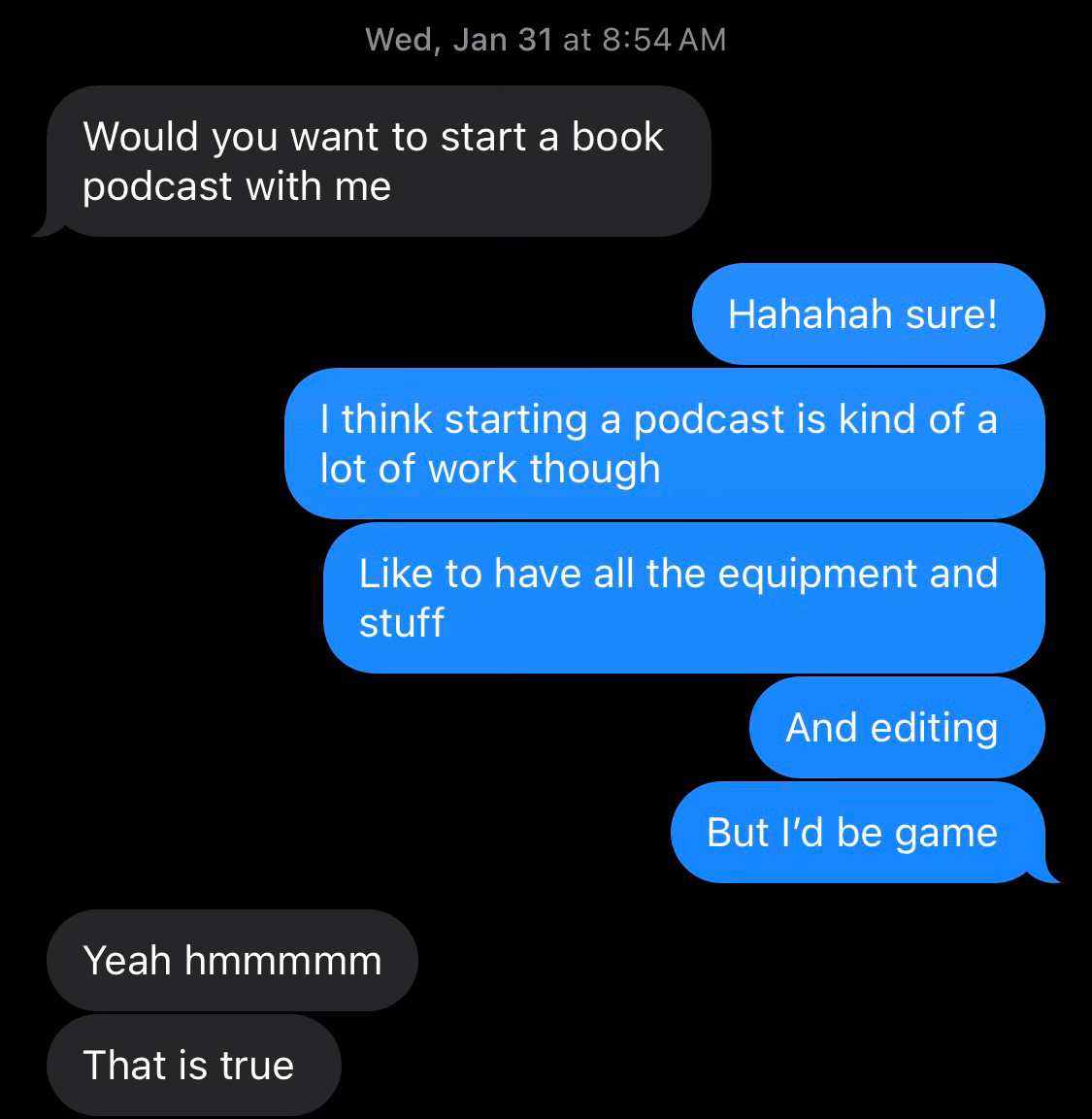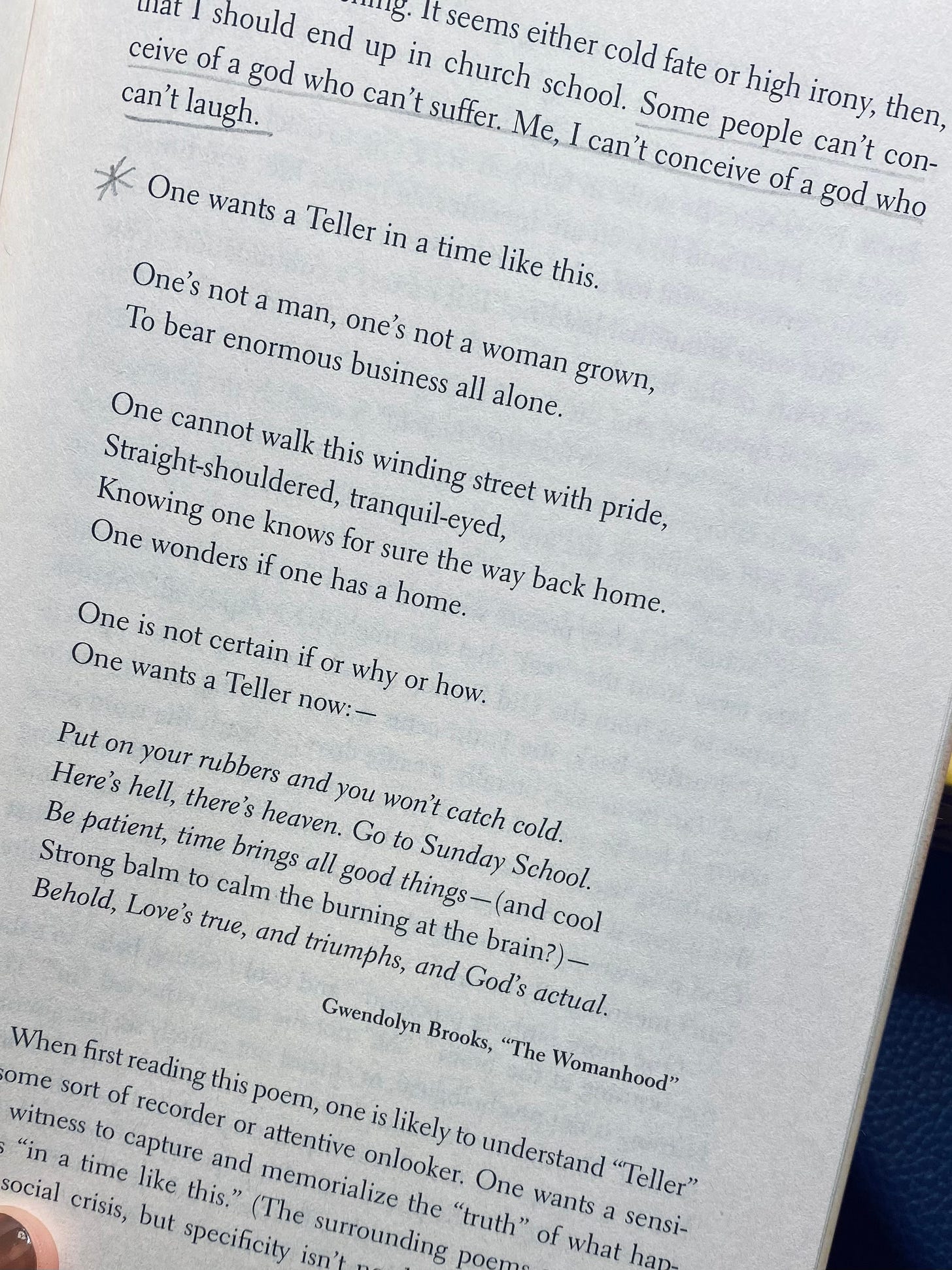Snake Eats Tail, Eve Starts Podcast
Zero at the Bone: Fifty Entries Against Despair by Christian Wiman
Dear reader! Today is the day! This review has been what feels like a very very long time coming. In reality, it hasn’t been that long, but you know. Time. Relative. Let me tell you, in unnecessary detail, how we got here.
On January 21st of this year I was in Charleston for my sister Kathryn’s birthday. We went to Buxton Books on King Street (highly recommend), and while I was valiantly fighting the urge to buy every book in sight, something caught my eye on a central table. It was Zero at the Bone: Fifty Entries Against Despair by Christian Wiman. I had first read about it a week or so beforehand in Erika Veurink’s Long Live where she simply wrote, “I love Christian Wiman and this is his greatest book yet.” That’s all it took! Maybe I should consider being less verbose…
From there, Zero at the Bone kept cropping up. In places that I can no longer recall, but I know it did. So I bought a copy, and my sister Kathryn bought one too.
Ten days later, she texted me out of the blue at 8:54am:
Then the fateful followup message came in…“I started Zero at the Bone…maybe we make that our first book.” Spoiler alert! She talked me into it. Although first I had to talk her OUT of “Two Girls One Book” as a title.
We recorded our trailer and the first episode in mid-March and then a week later rerecorded the trailer about 17 more times. Our first book was indeed Zero at the Bone, so I’ve been waiting to post my written review—consider it supplementary reading but like in a good way, not a boring way (?)—since I don’t know when exactly but probably mid February when I actually finished reading. Okay, okay! Enough with the timeline.
You can listen to our podcast wherever you get your podcasts, but for your convenience, here it is on Apple Podcasts…
…and here it is on Spotify.1
Please subscribe, follow, save, download, rate, review, etc. Oh and listen too—don’t forget to do that!
And once you have listened, you can come back here and read my extra special extra thoughts on the book, typed up lovingly, just for you. I said I had 10 pages worth of my favorite quotes typed out, and that’s only a slight exaggeration, so there’s plenty of material for me to work with.
One of my favorite parts of the book—and one that we didn’t discuss at all—was an entry early on—number 14, called “Kill the Creature.” It is a favorite of mine for many reasons—not least among them the fact that snakes, literal and symbological, serve as a uniting factor and kind of through line for the musings within.
Wiman begins by saying, “I’ve always loved snakes. Love includes fear…” and that spoke to me because I’ve always loved snakes too. Or at least I like to say that I love snakes. Love the idea of them, and maybe even love seeing them in real life—the little thrill! Though I’ve never feel much desire to push the bounds of proximity. I think it’s partly the name I was given and partly my youthful fascination (horrified and then not) with Medusa, and also, of course, my contrarian nature. I also think that Wiman is right though, and love includes fear. So perhaps everyone loves snakes a little bit, and I’m not being contrarian at all.
What these snake stories also illustrate is another element of the book, that I think when executed well (which it mostly is, though only perhaps not always quite enough), is part of what makes the whole thing so alluring. It’s the spattering and sprinkling in of the story of Christian Wiman’s life. Who is this man?
This entry includes stories from his childhood—seeking out snakes in empty parking lots in Mesquite, killing them at an oil-field construction job, spearing them in the muck at the bottom of a drained tank for another summer job. It includes what I believe to be the only mentions of his mother in the entire book. His father, in present day, suffering from dementia, escapes from each facility he’s placed in by pretending to be a doctor (is it fair to call it pretending?).
Amidst the scripture and the poetry and the philosophy…well it helps to know the person who’s unloading it all onto you. Which is what Christian Wiman is: a person. And that’s something we did talk about, Kathryn and I, that along with the intensity and the complexity and the above-your-head-ity of it all Wiman has a life story, and you get to feeling like you know him a bit. He’s self-aware, and he’s observant, he’s pessimistic, and optimistic, and funny. This entry—“Kill the Creature”—is an excellent example of this exact interplay. It needs the narrative glimmers because it’s intense and quite challenging, or at least it was to me. And that’s another reason why I really liked it.
There were moments where I felt I had lost the thread, we were annihilating the self with Simone Weil, then we were arguing that “if there is a reality distinct from our perception of it, there is no way we can reach it.” Then we’re talking about electrons and the double slit experiment?! Then a poem (by Wiman in this particular case) that requires second third fourth readings. Uhhhhh…
But then, we come up for air with this:
“There is nowhere to stand in order to be outside of what you are examining, for the object of observation is changed by the act of observation. Every gesture toward absolute human knowledge reaches right back to and with that first hand grabbing the apple. Even our equations implicate us.
This is not news, I realize…But as usual, science has simply confirmed what poets and proper theologians always—‘knew,’ I was going to say, but that would be wrong, unless knowing is always alert to the ultimate truth that it cannot know any ultimate truth, including the one this sentence is attempting to articulate. This is the ouroboros, the snake with its tail in its mouth.”
!!!!!!!!!!!!!!!!
If that’s not the good stuff, I don’t know what the hell is. It’s calming and invigorating at once. Even more so when later in the entry he applies this ouroboros concept to the fallibility of memory—“I believe one should hew to the facts as one remembers them, even as it seems scientifically incontrovertible that memory is mostly an act of imagination.” Just picture me hollerin’. And underlining, big fat scratchy pencil marks.
Life is full of these contradictory compromises—life, to me, is the search for knowledge, nestled within a sweet sensibility that the search is futile, with just there at the core, a little seed of a heart that sings, nothing is futile. This strange and beautiful bundle is a gory battleground that contains superlative joy. Does that make any sense? Yes, Life is full of contradiction and compromise and in the end we must learn to live with (and maybe dance with) the multitudes—within us and without of us.
And now I will leave you with the Gwendolyn Brooks poem that I mention fleetingly in the first episode of Something We Read, the podcast™ (in case you already forgot, I started a podcast with my sister). I loved it when I read it, and then I loved it even more when Wiman analyzed it in depth just for me. If you get the book yourself, he’ll do the same for you. Kisses!
Oh—and also! I will be attempting to figure out how to incorporate my podcast here on Substack. That way you’ll all get one extra email from me on the first Tuesday of every month to remind you that it exists, and I think you can listen to it right then and there? I don’t know how it all works, but you’ll find out if I succeed in my mission soon enough.





Omg Eve. Such complicated beautiful stuff and you write about it masterfully. Ouroboros! What a great new vocabulary word.
Enjoyed the podcast! Rock on!!